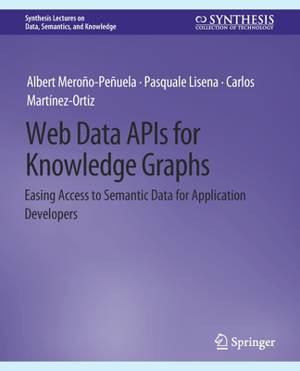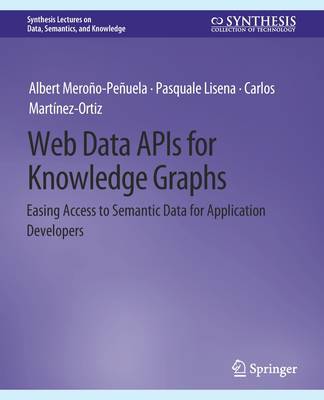
Door een staking bij bpost kan je online bestelling op dit moment iets langer onderweg zijn dan voorzien. Dringend iets nodig? Onze winkels ontvangen jou met open armen!
- Afhalen na 1 uur in een winkel met voorraad
- Gratis thuislevering in België vanaf € 30
- Ruim aanbod met 7 miljoen producten
Door een staking bij bpost kan je online bestelling op dit moment iets langer onderweg zijn dan voorzien. Dringend iets nodig? Onze winkels ontvangen jou met open armen!
- Afhalen na 1 uur in een winkel met voorraad
- Gratis thuislevering in België vanaf € 30
- Ruim aanbod met 7 miljoen producten
Zoeken
Web Data APIs for Knowledge Graphs
Easing Access to Semantic Data for Application Developers
Albert Meroño-Peñuela, Pasquale Lisena, Carlos Martínez-Ortiz
€ 63,45
+ 126 punten
Uitvoering
Omschrijving
This book describes a set of methods, architectures, and tools to extend the data pipeline at the disposal of developers when they need to publish and consume data from Knowledge Graphs (graph-structured knowledge bases that describe the entities and relations within a domain in a semantically meaningful way) using SPARQL, Web APIs, and JSON. To do so, it focuses on the paradigmatic cases of two middleware software packages, grlc and SPARQL Transformer, which automatically build and run SPARQL-based REST APIs and allow the specification of JSON schema results, respectively. The authors highlight the underlying principles behind these technologies--query management, declarative languages, new levels of indirection, abstraction layers, and separation of concerns--, explain their practical usage, and describe their penetration in research projects and industry. The book, therefore, serves a double purpose: to provide a sound and technical description of tools and methods at the disposal ofpublishers and developers to quickly deploy and consume Web Data APIs on top of Knowledge Graphs; and to propose an extensible and heterogeneous Knowledge Graph access infrastructure that accommodates a growing ecosystem of querying paradigms.
Specificaties
Betrokkenen
- Auteur(s):
- Uitgeverij:
Inhoud
- Aantal bladzijden:
- 92
- Taal:
- Engels
- Reeks:
Eigenschappen
- Productcode (EAN):
- 9783031007897
- Verschijningsdatum:
- 22/09/2021
- Uitvoering:
- Paperback
- Formaat:
- Trade paperback (VS)
- Afmetingen:
- 190 mm x 235 mm
- Gewicht:
- 213 g

Alleen bij Standaard Boekhandel
+ 126 punten op je klantenkaart van Standaard Boekhandel
Beoordelingen
We publiceren alleen reviews die voldoen aan de voorwaarden voor reviews. Bekijk onze voorwaarden voor reviews.











